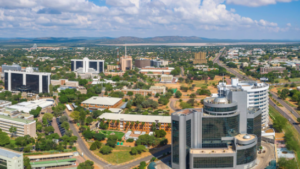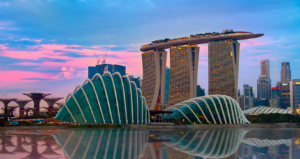Over the past few weeks my International Relations class partnered with students in a Comparative Politics at American University of Sharjah in the UAE to write podcast episodes about the UN Sustainable Development Goals. We found in each country that we studied that there are specific national and international factors that empower some states of the Global South to make more progress toward the UN Sustainable Development Goals than other states.
One of the main national factors that a country has to have to make the most progress on UN Sustainable Development Goals is political stability. Political stability often means that there is no war in the country. Also, to have political stability a country does not have to be a democracy but it has to have a stable government structure. As the podcast on Botswana said “without proper government [no country will fully] be able to excel in the national and international realm.” If a country has political stability they have a better chance of economic stability and better chance of aligning itself with and taking advantage of international players. For example, Botswana’s colonization has led to significant corruption in the government and the economy. This has led to difficulties meeting national goals like SDG 3 “good health and well-being.” Since there’s an abundance of economic crime and corruption in the economic system it would make sense that establishing a strong health care system is difficult in the country. People having access to healthcare is a main target of SDG 3.
The ability and willingness to work with international players will also play a role in a country’s ability to achieve the Sustainable Development Goals. Therefore the countries have to have some bureaucratic capacity and capability to interact with these international players in order to attract trade, investment, and aid to be more successful at meeting the Sustainable Development Goals. Singapore is an excellent example of a country that has already made strong progress towards SDG 16 “peace, justice and strong institutions. The People’s Action Party is a strong political party that has opened the doors for international partnerships. About 7,000 multinational companies are in Singapore, they have established free trade policies, and joined global markets helping their national trade interests. The involvement with international players have helped them build up their economy which has helped them to fund efforts to meet the Sustainable Development Goals.
These are just a couple examples of how national and international factors can contribute to certain countries in the Global South being more or less successful meeting the Sustainable Development Goals.


Botswana (on the left) and Singapore (on the right)
https://www.forbesafrica.com/africa-undiscovered/2023/01/23/botswana-a-hidden-gem-of-africa/ (Botswana picture)
https://uceap.universityofcalifornia.edu/programs/stem-research-in-singapore (Singapore picture)

2 responses to “How do national and international factors interact in empowering some states of the Global South to make more progress toward the UN Sustainable Development Goals than other states?”
Thank you for this insightful post! Political stability is in fact one of the most important factors that not only determine a country’s progress towards SDGs but its overall progress as well. Sometimes this instability is also reflected in a nation’s political structure in the form of corruption. Although Botswana aims to achieve SDGs by 2036 as a part of their Botswana Vision, the corruption and economic system of the country might now allow it. This was the case with Sri Lanka as well. The country’s political crisis has severely affected the progress towards SDG goals. Do you think achieving political stability in these countries would be enough to achieve SDGs?
Thank you for your thoughtful response and question! I do believe that achieving political stability is of the upmost importance for countries to make serious progress to achieves the SDGs.